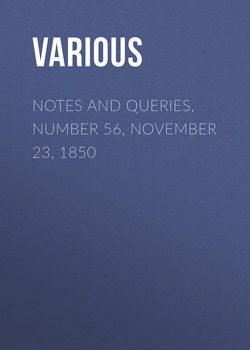Читать книгу Notes and Queries, Number 56, November 23, 1850 - Various - Страница 2
NOTES
GREEK PARTICLES ILLUSTRATED BY THE EASTERN LANGUAGES
ОглавлениеThe affinity which exists between such of the vernacular languages of India as are offshoots of the Sanscrit, as the Hindostanee, Mahratta, Guzeratee, &c., and the Greek, Latin, German, and English languages, is now well known to European scholars, more especially since the publication of the researches of Vans Kennedy, Professor Bopp of Berlin, &c. Indeed, scarcely a day passes in which the European resident in India may not recognise, in his intercourse with the natives, many familiar words in all those languages, clothed in an oriental dress. I am inclined also to think that new light may be thrown upon some of the impracticable Greek particles by a reference to the languages of the East; and without wishing to be understood as laying down anything dogmatically in the present communication, I hope, through the medium of your valuable publication, to attract attention to this subject, and invite discussion on it. Taking, as an illustration, the 233d line of the first book of the Iliad, where the hero of the poem is violently abusing Agamemnon for depriving him of his prize, the fair maid Briseis, he says,
"Αλλ' εκ τοι ερεω, και επι μεγαν ‛ορκον ‛ομουμαι."
What is the meaning of εκ in the above line? It is commonly construed with ερεω, and translated, "I plainly tell thee—I declare to thee;" εξερεω, "I speak out—proclaim." But may it not be identical with the Sanscrit ek, "one," a word, as most of your readers are doubtless aware, in universal use throughout India, Persia, &c; the rendering literally running thus:
"But one thing I tell thee," &c.
That this is the original sense of the line appears probable by comparing it with line 297. of the same book, where in the second speech of Achilles, that impiger, iracundus, inexorabilis, acer, chieftain again scolds "the king of men,"—
"Αλλο δε τοι ερεω, συ δ' ενε φρεσι βαλλεο σησι."
"And another thing I tell thee."
This rendering receives additional confirmation by a comparison with the following:
"Τουτο δε τοι ερεω."
Il. iii. 177., and Od. vii. 243.
"Παντα δε τοι ερεω."
Od. iv. 410., and x. 289.
In the last three lines Αλλο, Τουτο, and Παντα stand precisely in the same relation to ερεω that εκ does in the first, Αλλ' merely taking the place of δε, for the sake of versification.
"But one thing I tell thee.
And another thing I tell thee.
But this thing I tell thee.
And all things I tell thee."
It is not impossible that εξερεω may be a compound of εκ, "one," and ερεω, "I speak." There is in the Hindostanee an analogous form of expression, Ek bat bolo, "one word speak." This is constantly used to denote, speaking plainly; to speak decidedly; one word only; no display of unnecessary verbiage to conceal thought; no humbug; I tell thee plainly; I speak solemnly—once for all; which is precisely the meaning of εξερεω in all the passages where it occurs in Homer: e.g. Il. i. 212. (where it is employed by Minerva in her solemn address to Achilles); Il. viii. 286., Od. ix. 365. (where it is very characteristically used), &c.
The word ace (ace of spades, &c.) I suppose you will have no difficulty in identifying with the Sanscrit ek and the Greek εις, the c sometimes pronounced hard and sometimes soft. The Sanscrit das, the Greek δεκ-α, and the Latin dec-em, all signifying ten, on the same principle, have been long identified.
J. SH.
Bombay.
